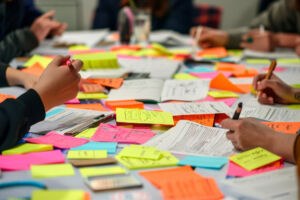Eleven success factors for transdisciplinary real-world labs. Integration and Implementation Insights
Niko Schäpke et al.
A consortium consisting of Leuphana University Lüneburg, ISOE and the Wuppertal Institute is carrying out the accompanying research for seven existing real-world laboratories in Baden-Württemberg.
The research approach of real-world laboratories is on the one hand oriented towards the transdisciplinary principle, particularly the interdisciplinary, problem orientated cooperation between different scientific disciplines and on the other hand towards the idea of an intensive participation of stakeholders within the societal action space defined as “laboratory” (often towns or districts). In this context, the main idea is mutual medium to long term learning in something like an experimental setting.
Real-world laboratories are seen as a novel form of networking and cooperation between science and society. The approach of real-world laboratories is aiming to facilitate the connectivity of scientific findings for politics and economy and also to support society’s capacity to act towards sustainable development. With a funding program for a total of seven real-world laboratories, Baden-Württemberg is playing a pioneering role as this approach is not yet very prevalent. Since January 2015 the Ministry of Science, Research and the Arts of the State of Baden-Württemberg (MWK) has been funding seven real-world laboratories. Amongst others, topics are sustainable mobility structures, sustainable urban development, the national park of the northern Black Forest or sustainable clothes consumption.
So far there is no generally accepted definition of the term real-world laboratories. The connection with the established term real experiments is also unclear. With respect to methodological issues the situation is similar. Repeatedly reference is made to transdisciplinarity and established methods but it is not stated clearly if and how these can be adequately applied within the context of real-world laboratories or if a broader methodology is called for. Against this background the MWK assigned a consortium with the accompanying research which is composed of the Leuphana University Lüneburg, the ISOE – Institute for social-ecological research and the Wuppertal Institute with an accompanying research (support and investigation) concerning the seven existing real-world laboratories in Baden-Württemberg. The research partners also closely cooperate with a second accompanying project which is based at the University of Basel.
The aims of the accompanying research are:
Ministry of Science, Research and the Arts of the State of Baden-Württemberg (MWK)
Niko Schäpke et al.
Matthias Bergmann et al.
What kind of knowledge is needed for social-ecological transformations? How can the perspectives and experiences of different stakeholder groups be incorporated into this process?
Go to Topic Page
